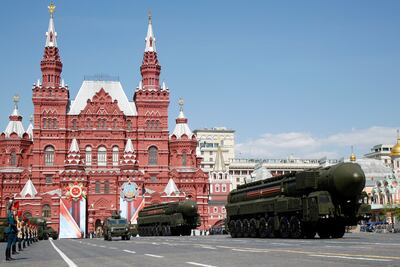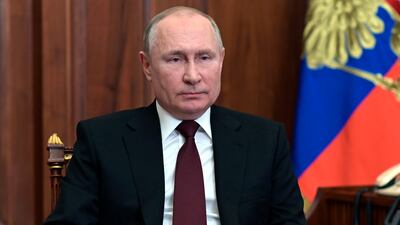Live updates: follow the latest news on Russia-Ukraine
The world cannot rely on leaders and military officers to make rational decisions when their fingers are over the nuclear launch button, new research says.
Analysts at Chatham House, a London think tank, said personal beliefs, biases and grievances could cloud the judgments of the heads of nuclear-armed states during the war in Ukraine.
The research was made public as diplomats seek to prevent Russia's invasion of Ukraine from escalating into a wider European conflict that would risk putting the nuclear arsenals of Nato powers and Russia in play.
Russian President Vladimir Putin added to the world’s alarm when he told senior defence officials to put nuclear forces on high alert.
Britain’s Prime Minister Boris Johnson said that was a distraction, while the US described it as provocative rhetoric and said it was not changing its own alert level.
But analysts who looked at three nuclear scares in the 1980s and 1990s said it was not certain that sensible human judgment would prevail, finding that the decision to use or threaten to use nuclear weapons "is not a rational process".
“It is impossible to read what is happening in Putin’s mind,” said report author Beyza Unal, who said it was important for other powers to make their nuclear posture as clear as possible.
“Nuclear decision-making is where rational irrationality is very common as personal beliefs, cognitive biases, and historical grievances become more attractive and can cloud judgments,” she said.
One of the cases studied from the Cold War, a 1983 false alarm when Soviet missile defences appeared to show an incoming American missile, came at what was also a time of heightened East-West tensions.
Analysts said Stanislav Petrov, the Soviet military officer who decided not to treat the threat as genuine, relied partly on a “feeling in his gut” that the US would not launch a surprise attack in this way.
The way this happened “makes clear that there are moments at which different decisions could have been reached,” the report said.
In the same year, a Nato preparedness exercise called Able Archer 83 gave rise to fears in Moscow that the drills were cover for a genuine first strike operation.

Individual decision-making again proved critical to defusing the crisis, and the lesson from that close call is that the two sides should maintain “effective, open and genuine communication channels” to prevent misinterpretation, the researchers said.
In the third case, in 1995, Norwegian and US scientists launched a rocket for a scientific programme which again triggered a missile alert in Moscow, with conflicting reports on whether then-president Boris Yeltsin was alerted.
Drawing on all of these incidents, analysts said that there was a risk of misinterpretation and miscommunication and the severe stress of a crisis might impair decision-making.
The Russian invasion of Ukraine came only weeks after the leaders of the US, Russia, Britain, France and China issued a joint statement committing their countries to the principle that a nuclear war must never be fought and could never be won.
But “for far too long, decision-makers developed their policies and strategies on the basis of rational parameters,” the report said.
This led to the formation of nuclear policies, such as mutually assured destruction, which rested “primarily on the assumption that decisions will be rational”, when in fact there is no knowing how people might react.
They recommended training decision-makers and duty officers in how their biases and impulses might affect them at moments of crisis.
Other proposals included learning from past nuclear scares and setting up dedicated risk reduction centres that receive notifications of missile tests.
“Today there is increased complexity across different levels,” partly because the US and Russia are no longer the world’s two premier superpowers, Dr Unal said.
“Similarly, states do not agree on what constitutes as risk or threat. Putin’s understanding of nuclear risk, for instance, is likely to differ from that of the West.”


